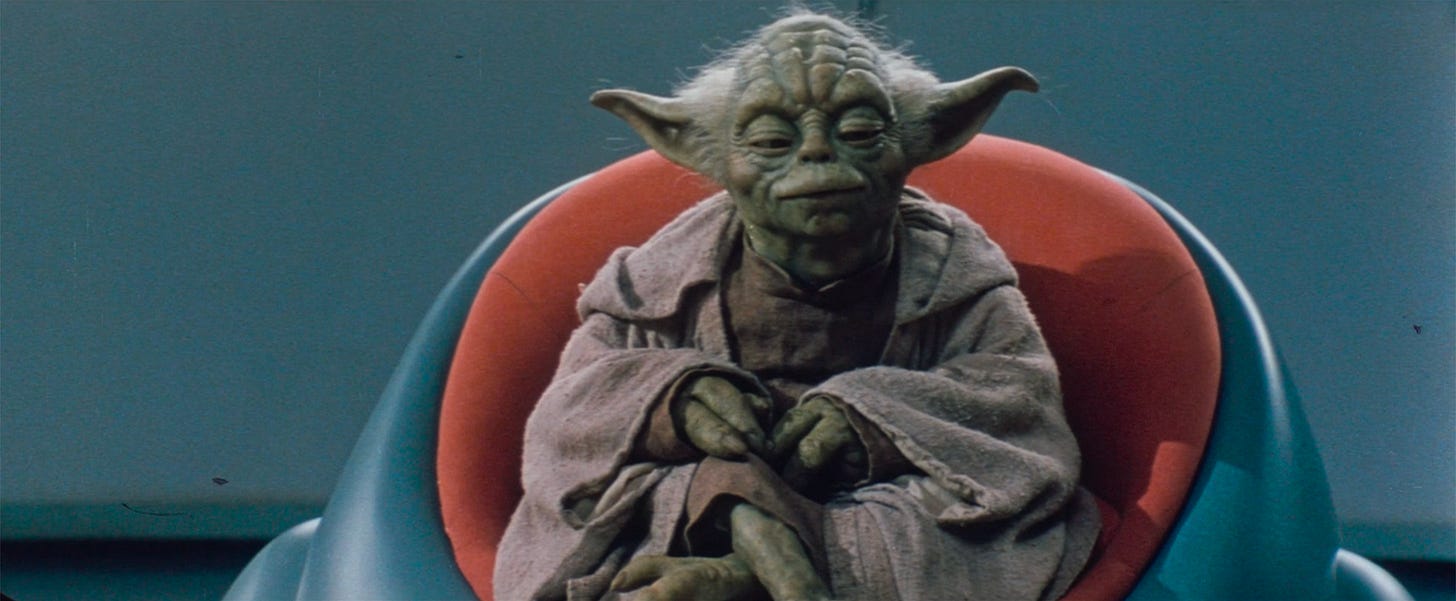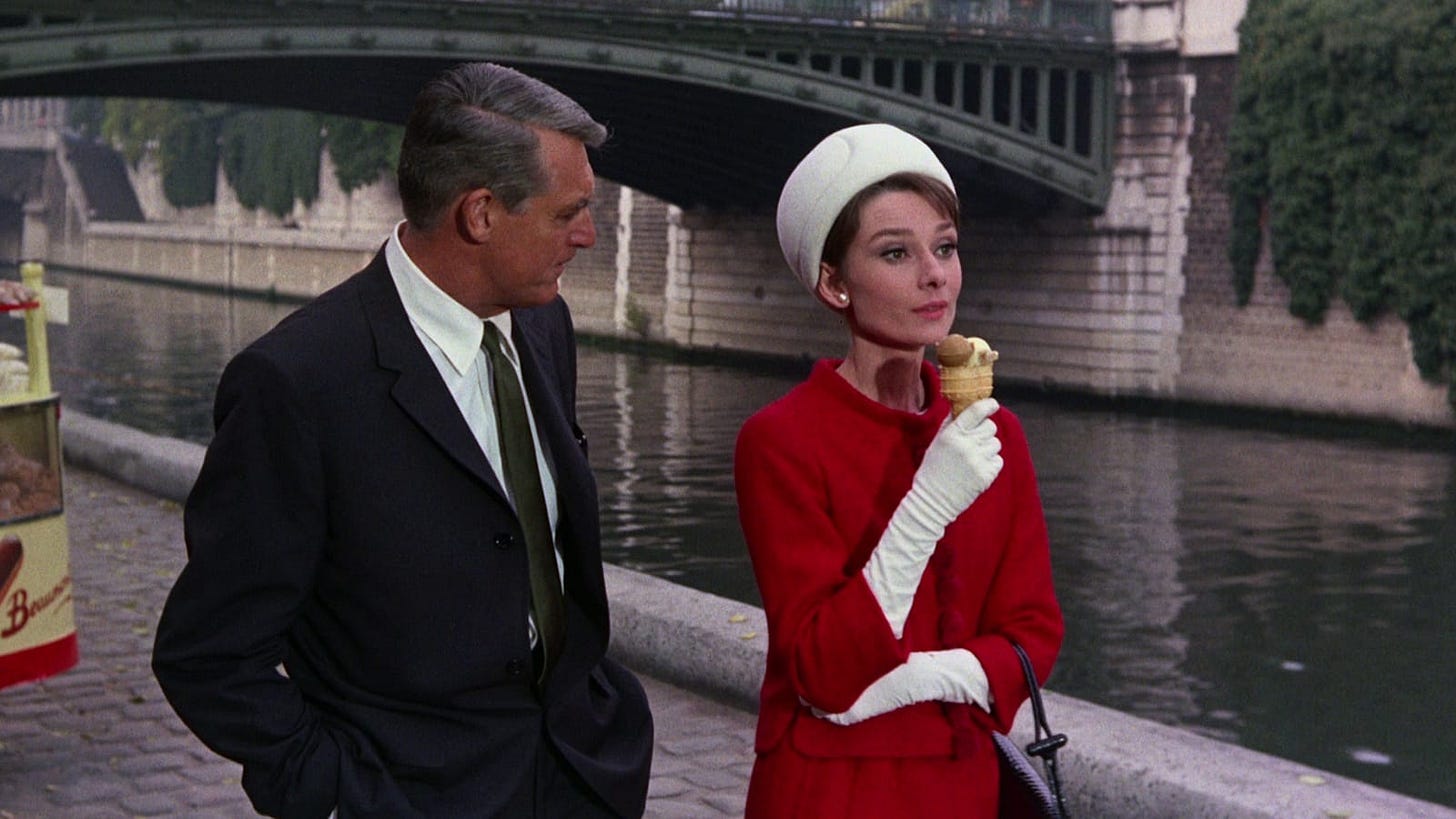Dispatches from the Deep (September 23 - 29, 2024)
So go back to the club
I always feel a little sheepish and self-deprecating writing these intros, so I’m going to think of something better to do for the next entry because I can’t keep getting down on myself in my own blog. Words of the week are mesoscale1 and mésalliance (or misalliance).2
I read a few things worth noting this week, including a review of The Substance (still hate it), a book review about the Bronze Age Collapse (recommended in the acknowledgements of Beautiful World, Where Are You), and an article about an artist whose painting I really liked when I was at MoMA last week (Leonora Carrington!). Because Megalopolis came out this week, I’ve read a ton of stuff about the film, it’s production, and digital filmmaking in general. Most of those are linked in the entry about it later, but I also would point anyone interested in early digital cinema to this BFI article on the history of that era and this listicle (also from BFI) for some recommendations, most of which are on my own watchlist. Finally, next week I will be attending the New York Film Festival, which is partially sponsored by Bloomberg Philanthropies, an organization that supports West Bank settlement. An open letter was published recently calling for an end to this sponsorship, a position I agree with wholeheartedly. You can read the letter here.

Elden Ring
Little to report here; I’m cruising through the DLC. Alice asked me to note that she found some guys struggling to dig their friend out of the snow in the Consecrated Snowfield. It was a sad scene!
Star Wars Episode I: The Phantom Menace (1999, George Lucas)
I was looking at Letterboxd and apparently this is the third time I’ve watched Episode I this year, which is a bit crazy of me. This time, I watched a scan of a Czech 35mm print, which means one thing: puppet Yoda. For those not in the know, the latter two prequels were filmed digitally, but TPM was shot almost entirely on film (this is my second of three plugs for that BFI article on early digital cinema). Yoda also gets a finale, of sorts, as this also marks the last time he would be a Frank Oz puppet in the series. However, the powers that be (Lucas, now Disney) don’t like puppet Yoda, so he’s almost 100% CGI in the current offerings on Disney+. Enter the Czech 35mm print, which is all puppet, all the time. In addition to puppet time, the print really highlighted the realness of an otherwise pretty unreal setting. Lucas is just as preoccupied with racing hot rods as he was when he made American Graffiti. Instead of the morning sun of the Valley, it’s the blazing twin suns of Tatooine. That transposition becomes so much clearer with the film grain.
Unknown Pleasures (2002, Jia Zhangke)
In anticipation of Megalopolis later in the week, I watched Jia Zhangke’s third feature and first shot digitally, 2002’s Unknown Pleasures. I’ve been slowly working my way through his entire filmography the last few months. I want to watch it all chronologically, but I hadn’t had a chance to watch Platform yet, so I just skipped it for now. Unknown Pleasures follows three wayward young people in a China that’s changing faster than they can comprehend. Jia weaves the rapid shifts in the international and domestic landscape into what might otherwise be a highly individualistic story. It’s my favorite of his work so far, and what I can identify as his main preoccupations (my wife is so hot; who is left behind by change) are interesting enough that I’m glad I’m on this journey with him.
Michael Clayton
Everything is gambling. Everywhere is Las Vegas. Only the house is winning. Since Alice showed this to me for the first time last year, Michael Clayton has quickly become one of my favorite movies. It’s tight, it’s thrilling, it has actors doing great work (George Clooney as a down-on-his-luck fixer for a big law firm; Tilda Swinton as the in-over-her-head executive of a chemical company). There’s very little to not love about Michael Clayton.
Charade (1963, Stanley Donen)
They don’t put “Miss Hepburn’s Clothes by GIVENCHY” in title credits anymore. That’s probably because Audrey Hepburn is dead, but surely there is someone skinny enough these days who would warrant such a note. Maybe Zendaya? This is a kind of beautifully plot-irrelevant star vehicle for Hepburn and Cary Grant to flirt. There’s such fun banter between the two of them, I almost want to get involved with him, too. Maybe I just wish I was like Hepburn’s Regina and didn’t know how the CIA was doing unlimited crimes against humanity during this period—didn’t even know what the CIA is. Foot massage ending was a big lol moment. I was planing to go see this at the Library of Congress’ little screening room, but I opted to just watch it on Kanopy because I couldn’t be sure if it was going to be in 35mm or not. I’m quite serious about my goals for the year, and I don’t want to waste my time going over there if it’s not actually going to be on film. Next time!
Megalopolis (2024, Francis Ford Coppola)
A little movie came out this week that you may have heard of called Francis Ford Coppola’s Megalopolis (A Fable). I saw it at Landmark E Street with Alice and zero, unfortunately, audience participation. Many have noted that it cost $120 million to make, money that apparently all came from the partial sale of Coppola’s vineyard. Many have noted that it took decades to make, so long that its production both far predates and far postdates George Lucas’ Attack of the Clones.3 Many have noted that Coppola sexually harassed women on set and sought out ‘cancelled’ actors for the film. Many have noted that it looks like “shit” (i.e., CGI straight out of Southland Tales, a movie that came out in 2006 with a budget of $40 million). Many have noted that it features real footage from 9/11. Adam Driver is Cesar Catallina, a Randian guy with an “Emersonian mind”4 who can stop time and wants to turn “New Rome” (New York City as seen through footage of Atlanta) into Megalopolis, a utopia because people debate ideas and have houses built out of goopy metal. He, early on, delivers the entire “To Be or Not To Be” monologue from Hamlet while acting like Dracula. Aubrey Plaza is Wow Platinum. At one point she makes one-time crossdresser/Nazi and Cesar’s cousin (played by Shia LeBeouf, one of those multiple, intentionally cast cancelled guys in this) eat her out and do finance crimes. Giancarlo Esposito is literally Eric Adams. As far as digital hellscapes about the effects of 9/11 and postmodernity on America and/or the artistic process made by directors with sort of embarrassingly liberal ideas about the future go, it’s no Star Wars Episode III: Revenge of the Sith. The world is ending, and Francis Ford Coppola will not be here to see it go. Nor will his film, for that matter, given how short the actual life of digital film might be compared to celluloid. People are talking a lot about it, but I have a hard time imagining it having significant reverberations after the initial hype cycle concludes. For now, I can’t stop thinking about it.
Detransition, Baby (2021, Torrey Peters) & Atmospheric Disturbances (2008, Rivka Galchen)
This is the fourth time I’ve read Detransition, Baby, so I don’t have any deep thoughts I haven’t had already. It’s been a pleasant book to read annually as I grow and change. Ames becomes less sympathetic each read (he’s a real dingus, get away from him, ladies). Reese becomes goofier and sadder with each read. And I find myself identifying with Katrina more and more. Get that abortion, queen! Another guy being weird to the women in his life is the protagonist of Rivka Galchen’s Atmospheric Disturbances. I thought it was quite touching, and I got a little misty eyed when it ended. Alice’s recommendations for readings are not to be taken lightly, and I implore anyone lucky enough to receive one to go read whatever it is as soon as possible.
Thanks for reading this week!
xoxo,
Daniela
Mesoscale (n.): The scale of distance over which phenomena such as storms occur (typically of the order of tens of kilometres), which is intermediate between the scale of high and low pressure weather systems and that of microclimates. Frequently attributive.
Mésalliance (n.): A union between two people that is thought to be unsuitable or inappropriate; esp. a marriage with a person of a lower social position. Also figurative.
Misalliance (n.): An improper alliance, association, or union; esp. an unsuitable marriage. Cf. mésalliance n. Also in extended use.
Seriously, this article is really cool!
This is somehow only one of many weird lines/deliveries in the scene I embedded. What a silly movie.




I just realized I can comment. I came for the clever Megalopolis hate.